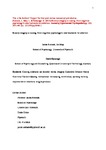Sensory imagery in craving: From cognitive psychology to new treatments for addiction.
| dc.contributor.author | Andrade, Jackie | |
| dc.contributor.author | May, Jon | |
| dc.contributor.author | Kavanagh, DK | |
| dc.date.accessioned | 2012-05-18T15:53:03Z | |
| dc.date.available | 2012-05-18T15:53:03Z | |
| dc.date.issued | 2012 | |
| dc.identifier.uri | http://hdl.handle.net/10026.1/1000 | |
| dc.description.abstract |
Sensory imagery is a powerful tool for inducing craving because it is a key component of the cognitive system that underpins human motivation. The role of sensory imagery in motivation is explained by Elaborated Intrusion (EI) theory. Imagery plays an important role in motivation because it conveys the emotional qualities of the desired event, mimicking anticipated pleasure or relief, and continual elaboration of the imagery ensures that the target stays in mind. We argue that craving is a conscious state, intervening between unconscious triggers and consumption, and summarise evidence that interfering with sensory imagery can weaken cravings. We argue that treatments for addiction can be enhanced by the application of EI theory to maintain motivation, and assist in the management of craving in high-risk situations. | |
| dc.format.extent | 127-145 | |
| dc.language.iso | en | |
| dc.title | Sensory imagery in craving: From cognitive psychology to new treatments for addiction. | |
| dc.type | journal-article | |
| dc.type | Article | |
| plymouth.issue | 2 | |
| plymouth.volume | 3 | |
| plymouth.publication-status | Published | |
| plymouth.journal | Journal of Experimental Psychopathology | |
| dc.identifier.doi | 10.1016/jep.024611 | |
| plymouth.organisational-group | /Plymouth | |
| plymouth.organisational-group | /Plymouth/Admin Group - REF | |
| plymouth.organisational-group | /Plymouth/Admin Group - REF/REF Admin Group - FoH | |
| plymouth.organisational-group | /Plymouth/Faculty of Health | |
| plymouth.organisational-group | /Plymouth/REF 2021 Researchers by UoA | |
| plymouth.organisational-group | /Plymouth/REF 2021 Researchers by UoA/UoA04 Psychology, Psychiatry and Neuroscience | |
| plymouth.organisational-group | /Plymouth/REF 2021 Researchers by UoA/UoA04 Psychology, Psychiatry and Neuroscience/UoA04 REF peer reviewers | |
| plymouth.organisational-group | /Plymouth/Research Groups | |
| plymouth.organisational-group | /Plymouth/Research Groups/Centre for Brain, Cognition and Behaviour (CBCB) | |
| plymouth.organisational-group | /Plymouth/Research Groups/Centre for Brain, Cognition and Behaviour (CBCB)/Behaviour | |
| plymouth.organisational-group | /Plymouth/Research Groups/Centre for Brain, Cognition and Behaviour (CBCB)/Cognition | |
| plymouth.organisational-group | /Plymouth/Research Groups/Institute of Health and Community | |
| plymouth.organisational-group | /Plymouth/Users by role | |
| plymouth.organisational-group | /Plymouth/Users by role/Academics | |
| dc.rights.embargoperiod | Not known | |
| rioxxterms.versionofrecord | 10.1016/jep.024611 | |
| rioxxterms.licenseref.uri | http://www.rioxx.net/licenses/all-rights-reserved | |
| rioxxterms.type | Journal Article/Review |


